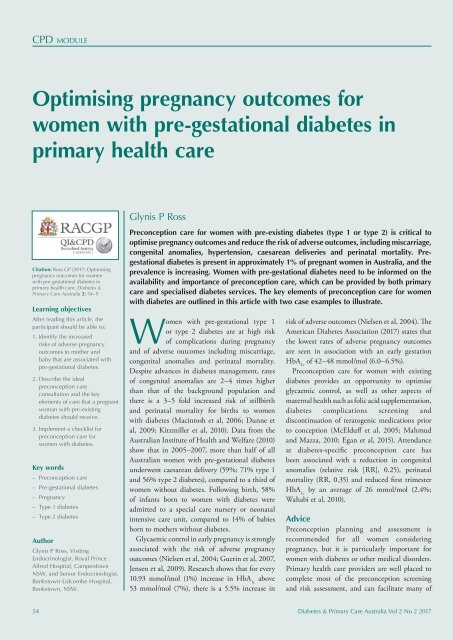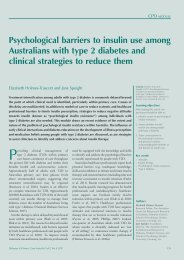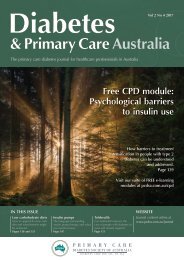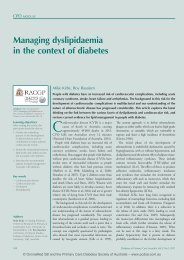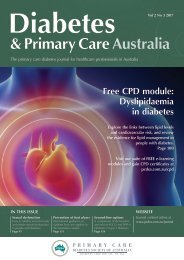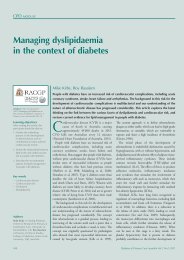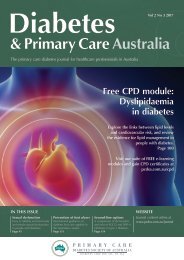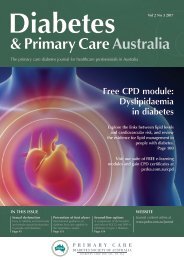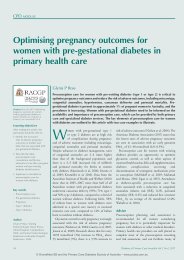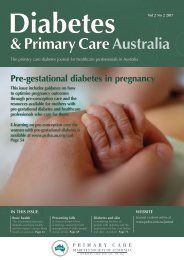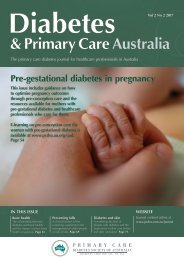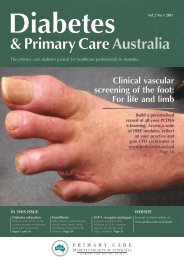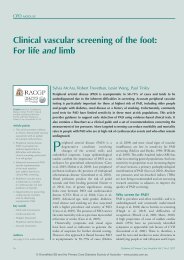DPCA2-2_issue_v3
You also want an ePaper? Increase the reach of your titles
YUMPU automatically turns print PDFs into web optimized ePapers that Google loves.
CPD module<br />
Optimising pregnancy outcomes for<br />
women with pre-gestational diabetes in<br />
primary health care<br />
Glynis P Ross<br />
Citation: Ross GP (2017) Optimising<br />
pregnancy outcomes for women<br />
with pre-gestational diabetes in<br />
primary health care. Diabetes &<br />
Primary Care Australia 2: 54–9<br />
Learning objectives<br />
After reading this article, the<br />
participant should be able to:<br />
1. Identify the increased<br />
risks of adverse pregnancy<br />
outcomes to mother and<br />
baby that are associated with<br />
pre-gestational diabetes.<br />
2. Describe the ideal<br />
preconception care<br />
consultation and the key<br />
elements of care that a pregnant<br />
woman with pre-existing<br />
diabetes should receive.<br />
3. Implement a checklist for<br />
preconception care for<br />
women with diabetes.<br />
Key words<br />
– Preconception care<br />
– Pre-gestational diabetes<br />
– Pregnancy<br />
– Type 1 diabetes<br />
– Type 2 diabetes<br />
Author<br />
Glynis P Ross, Visiting<br />
Endocrinologist, Royal Prince<br />
Alfred Hospital, Camperdown<br />
NSW, and Senior Endocrinologist,<br />
Bankstown-Lidcombe Hospital,<br />
Bankstown, NSW.<br />
Preconception care for women with pre-existing diabetes (type 1 or type 2) is critical to<br />
optimise pregnancy outcomes and reduce the risk of adverse outcomes, including miscarriage,<br />
congenital anomalies, hypertension, caesarean deliveries and perinatal mortality. Pregestational<br />
diabetes is present in approximately 1% of pregnant women in Australia, and the<br />
prevalence is increasing. Women with pre-gestational diabetes need to be informed on the<br />
availability and importance of preconception care, which can be provided by both primary<br />
care and specialised diabetes services. The key elements of preconception care for women<br />
with diabetes are outlined in this article with two case examples to illustrate.<br />
Women with pre-gestational type 1<br />
or type 2 diabetes are at high risk<br />
of complications during pregnancy<br />
and of adverse outcomes including miscarriage,<br />
congenital anomalies and perinatal mortality.<br />
Despite advances in diabetes management, rates<br />
of congenital anomalies are 2–4 times higher<br />
than that of the background population and<br />
there is a 3–5 fold increased risk of stillbirth<br />
and perinatal mortality for births to women<br />
with diabetes (Macintosh et al, 2006; Dunne et<br />
al, 2009; Kitzmiller et al, 2010). Data from the<br />
Australian Institute of Health and Welfare (2010)<br />
show that in 2005–2007, more than half of all<br />
Australian women with pre-gestational diabetes<br />
underwent caesarean delivery (59%; 71% type 1<br />
and 56% type 2 diabetes), compared to a third of<br />
women without diabetes. Following birth, 58%<br />
of infants born to women with diabetes were<br />
admitted to a special care nursery or neonatal<br />
intensive care unit, compared to 14% of babies<br />
born to mothers without diabetes.<br />
Glycaemic control in early pregnancy is strongly<br />
associated with the risk of adverse pregnancy<br />
outcomes (Nielsen et al, 2004; Guerin et al, 2007,<br />
Jensen et al, 2009). Research shows that for every<br />
10.93 mmol/mol (1%) increase in HbA 1c<br />
above<br />
53 mmol/mol (7%), there is a 5.5% increase in<br />
risk of adverse outcomes (Nielsen et al, 2004). The<br />
American Diabetes Association (2017) states that<br />
the lowest rates of adverse pregnancy outcomes<br />
are seen in association with an early gestation<br />
HbA 1c<br />
of 42–48 mmol/mol (6.0–6.5%).<br />
Preconception care for women with existing<br />
diabetes provides an opportunity to optimise<br />
glycaemic control, as well as other aspects of<br />
maternal health such as folic acid supplementation,<br />
diabetes complications screening and<br />
discontinuation of teratogenic medications prior<br />
to conception (McElduff et al, 2005; Mahmud<br />
and Mazza, 2010; Egan et al, 2015). Attendance<br />
at diabetes-specific preconception care has<br />
been associated with a reduction in congenital<br />
anomalies (relative risk [RR], 0.25), perinatal<br />
mortality (RR, 0.35) and reduced first trimester<br />
HbA 1c<br />
by an average of 26 mmol/mol (2.4%;<br />
Wahabi et al, 2010).<br />
Advice<br />
Preconception planning and assessment is<br />
recommended for all women considering<br />
pregnancy, but it is particularly important for<br />
women with diabetes or other medical disorders.<br />
Primary health care providers are well placed to<br />
complete most of the preconception screening<br />
and risk assessment, and can facilitate many of<br />
54 Diabetes & Primary Care Australia Vol 2 No 2 2017


